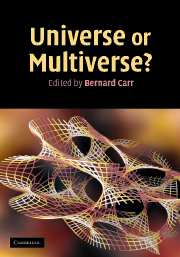Book contents
- Frontmatter
- Contents
- List of contributors
- Preface
- Acknowledgements
- Editorial note
- Part I Overviews
- Part II Cosmology and astrophysics
- Part III Particle physics and quantum theory
- Part IV More general philosophical issues
- 20 Scientific alternatives to the anthropic principle
- 21 Making predictions in a multiverse: conundrums, dangers, coincidences
- 22 Multiverses: description, uniqueness and testing
- 23 Predictions and tests of multiverse theories
- 24 Observation selection theory and cosmological fine-tuning
- 25 Are anthropic arguments, involving multiverses and beyond, legitimate?
- 26 The multiverse hypothesis: a theistic perspective
- 27 Living in a simulated universe
- 28 Universes galore: where will it all end?
- Index
- References
24 - Observation selection theory and cosmological fine-tuning
Published online by Cambridge University Press: 05 July 2014
- Frontmatter
- Contents
- List of contributors
- Preface
- Acknowledgements
- Editorial note
- Part I Overviews
- Part II Cosmology and astrophysics
- Part III Particle physics and quantum theory
- Part IV More general philosophical issues
- 20 Scientific alternatives to the anthropic principle
- 21 Making predictions in a multiverse: conundrums, dangers, coincidences
- 22 Multiverses: description, uniqueness and testing
- 23 Predictions and tests of multiverse theories
- 24 Observation selection theory and cosmological fine-tuning
- 25 Are anthropic arguments, involving multiverses and beyond, legitimate?
- 26 The multiverse hypothesis: a theistic perspective
- 27 Living in a simulated universe
- 28 Universes galore: where will it all end?
- Index
- References
Summary
Introduction
When our measurement instruments sample from only a subspace of the domain that we are seeking to understand, or when they sample with uneven sampling density from the target domain, the resulting data will be affected by a selection effect. If we ignore such selection effects, our conclusions may suffer from selection biases. A classic example of this kind of bias is the election poll taken by the Literary Digest in 1936. On the basis of a large survey, the Digest predicted that Alf Langdon, the Republican presidential candidate, would win by a large margin. But the actual election resulted in a landslide for the incumbent, Franklin D. Roosevelt. How could such a large sample size produce such a wayward prediction? The Digest, it turned out, had harvested the addresses for its survey mainly from telephone books and motor vehicle registries. This introduced a strong selection bias. The poor of the depression era — a group that disproportionally supported Roosevelt — often did not have phones or cars.
The Literary Digest suffered a major reputation loss and soon went out of business. It was superseded by a new generation of pollsters, including George Gallup, who not only got the 1936 election right, but also managed to predict what the Digest's prediction would be to within 1%, using a sample size that was only one-thousandth as large. The key to his success lay in his accounting for known selection effects. Statistical techniques are now routinely used to correct for many kinds of selection bias.
- Type
- Chapter
- Information
- Universe or Multiverse? , pp. 431 - 444Publisher: Cambridge University PressPrint publication year: 2007
References
- 1
- Cited by



